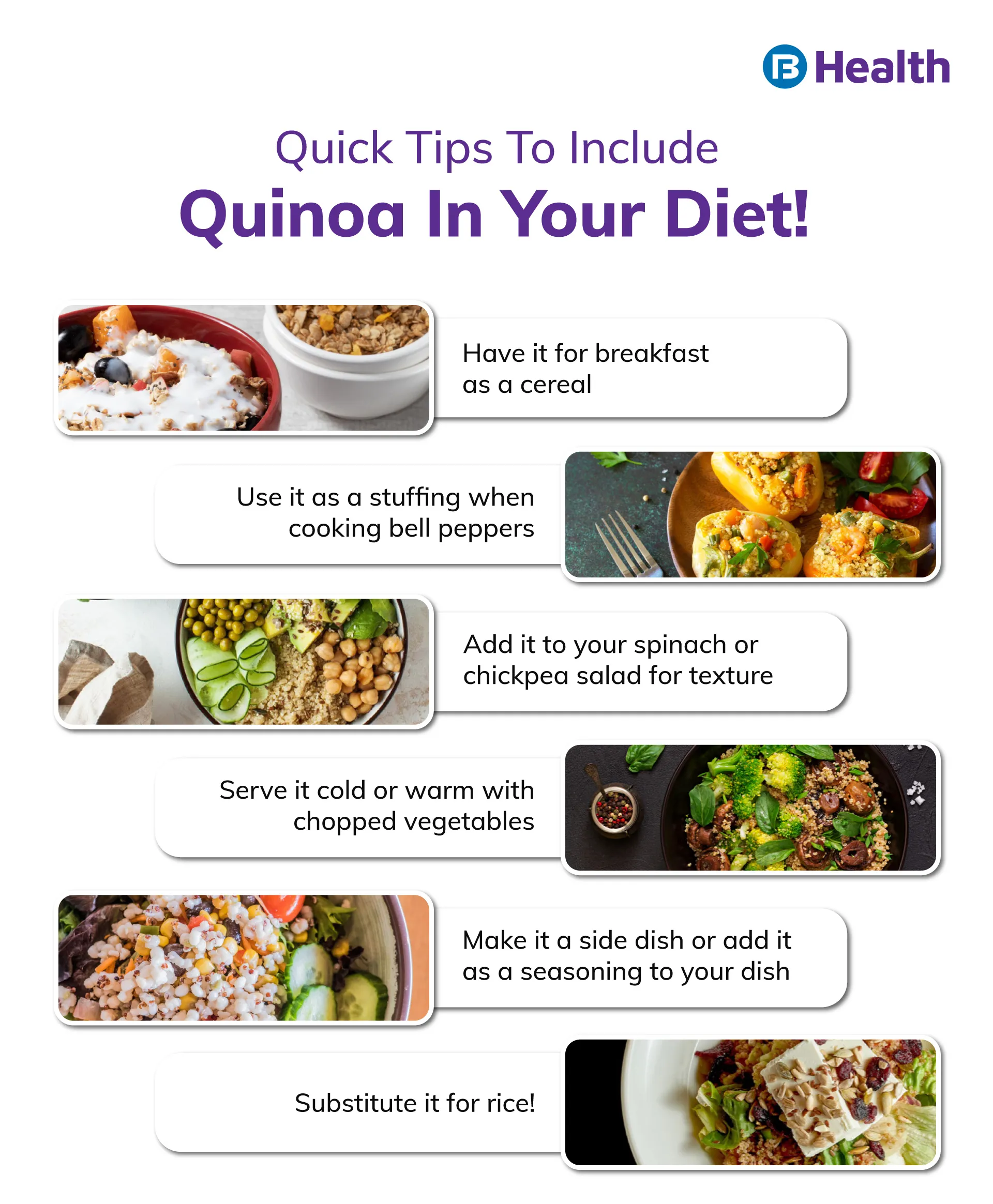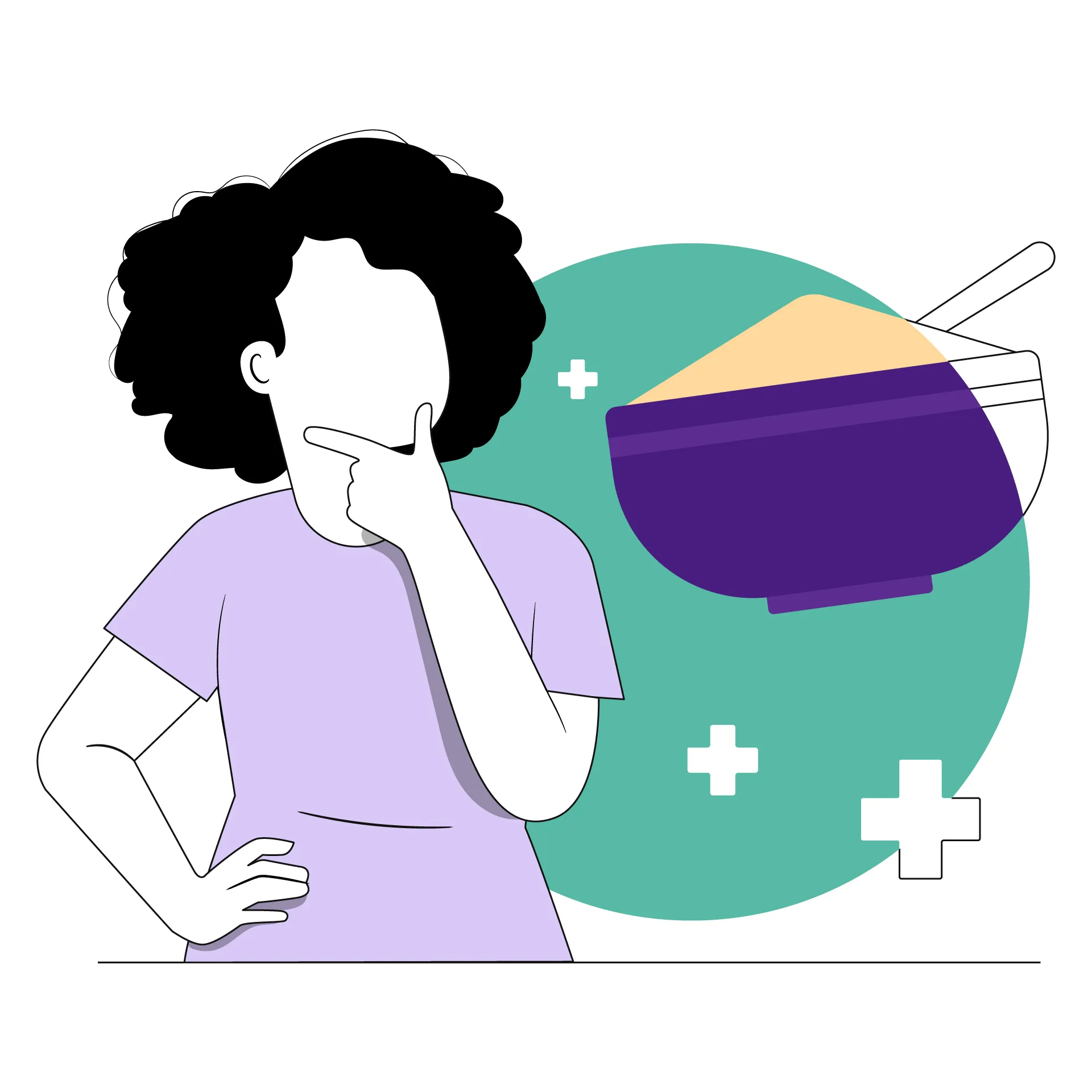Nutrition | 8 min read
Quinoa: Nutritional Facts, Health Benefits, Side Effects
Medically reviewed by
Table of Content
Key Takeaways
- Quinoa is the seed from Chenopodium plant, mainly grown in Peru & Bolivia
- Quinoa benefits your heart health and improves your blood sugar level
- Having quinoa for weight loss is smart because it is rich in protein and fiber
Gaining popularity in the past decade, quinoa is known for the nutritional value it adds to your plate. It contains iron, zinc, manganese, vitamin B6, copper, and more. Apart from the nutritional benefits of quinoa, keep in mind that it is a gluten-free grain. This makes it a popular choice among health-conscious people.
Read on to understand what is quinoa and the benefits it offers.
What is Quinoa?
Quinoa, a gluten-free alternative to starchy grains such as wheat, rye, or barley, is a seed from the Chenopodium plant. Despite being more popular now, it is still majorly produced in Peru and Bolivia. Since it has no gluten, it is also a popular option for those who have wheat allergies, celiac disease or are on a gluten-free diet. It is known as a pseudo-grain because it has nutrients similar to that of a grain. You can also eat quinoa the same way as a grain.
Nutritional Value Of Quinoa
Quinoa is a grain that originates from the Andes Mountains in South America. It was first cultivated by the ancient Incas and has been a staple food in the region for centuries. Quinoa is a highly nutritious grain and is considered a superfood by many nutrition experts.
Quinoa is a good source of protein, fiber, vitamins, and minerals, including iron, magnesium, and phosphorus. It is also a good source of antioxidants. One cup of cooked quinoa provides about 220 calories, 5 grams of fat, 9 grams of protein, and 40 grams of carbohydrates.
Quinoa is a versatile grain that can be used in a variety of dishes. It can be cooked and eaten like rice, used in soups and salads, or ground into flour for baking. Quinoa is a healthy alternative to other grains and can be a good addition to a healthy diet.
Quinoa Benefits
Quinoa is rich in magnesium, which is important for bone health
Quinoa is a nutrient-rich grain that has many health benefits. One of the most important nutrients in quinoa is magnesium. Magnesium is essential for bone health, and quinoa is a great source of this vital nutrient. For people who are looking to improve their bone health, quinoa is a great food to add to their diet.
Quinoa contains antioxidants that can help protect the body against disease
Quinoa is a healthy grain that is high in antioxidants. These antioxidants can help to protect the body against disease. Quinoa is also a good source of protein and fiber and is gluten-free. This makes it a great choice for those looking for a healthy alternative to wheat.
Quinoa for weight loss
This ancient grain is naturally low in fat and calories, and it's also packed with protein, fiber, and other nutrients that can help keep you feeling full and satisfied. Plus, quinoa is super versatile and can be used in various recipes, so you'll never get bored eating it.
Quinoa has a low glycemic index
Quinoa has a low glycemic index, which means it doesn't spike your blood sugar levels as other foods can. This makes it a great choice for people with diabetes or those who are trying to manage their weight. Quinoa is also a good source of fiber and protein, so it can help you feel full and satisfied after eating it. Plus, it's gluten-free, so it's a great option for people with celiac disease or gluten intolerance.
Quinoa is naturally low in fat and calories
Quinoa is a protein-packed superfood that is naturally low in fat and calories. This makes it a great option for those looking to lose weight or maintain a healthy weight. Quinoa is also high in fiber and antioxidants, making it a nutritious addition to any diet.
Acts as a source of high protein
Quinoa, seeds from Chenopodium, is a plant-based protein-dense food. In 100g of cooked quinoa, you add 8 grams of protein to your dish [1]. This makes it one of the highest protein foods and a great addition to your high protein diet. Protein helps keep your body healthy and regulates its function. It is also often referred to as a complete protein because it contains all 9 essential amino acids that your body needs. With quinoa, protein needs of your body are met, especially if you follow a vegan or vegetarian diet.
Additional Read: Vegan Diet Plan
Improves your metabolic health
If you have high cholesterol levels, adding quinoa to your meal may help you keep it under control. According to research, regular quinoa consumption may reduce your total LDL cholesterol levels and triglycerides as well. Though there needs to be more research on its effects on your cholesterol. Optimum cholesterol levels also lead to improved metabolic health.
Comes with vitamins and minerals
One of the reasons for quinoa’s popularity is the nutrients it comes with. It is a great source of the following nutrients
- Magnesium
- Copper
- Folate
- Zinc
- Thiamin
- Vitamin B6
- Iron
- Manganese
- Phosphorus
It is also low in calories making it a great food for you to get the vital vitamins, fiber, and minerals.
Boosts gut health
Other than being one of the highest protein foods, quinoa also offers a good amount of fiber. It has approximately 5g of fiber, which is 18% of the daily recommended intake. A fiber-rich food will promote good bacteria in your gut and regulate your bowel movements.
Lowers your risk of chronic health conditions
Quinoa has anti-inflammatory phytonutrients. Due to this, it is good for preventing and treating certain health conditions [2]. It also has omega-3 fatty acids and monounsaturated fats that are good for your heart health. This also reduces your risk of a chronic health condition.
Balances your blood sugar level
Considered a whole grain, quinoa is good for your blood sugar too. Whole grains are linked to lowering the risk of type 2 diabetes [3]. This food also improves your blood sugar levels. Since diet has a direct effect on type 2 diabetes, It is also a great addition to a healthy diabetes diet!
Aids in weight loss
Eating quinoa for weight loss is smart because it has high protein and fiber content. Protein and fibers help reduce overeating by making you feel full. The low glycemic index also helps reduce the triggers for hunger and various cravings.
Additional Read: Peanut Butter Benefits to Lose WeightDespite similar properties, in comparison to quinoa, rice has more calories and fewer health benefits. This makes quinoa a more favored gluten-free grain. But excessive consumption of quinoa may cause you to experience some of the following issues:
- Stomachache
- Bloating
- Discomfort
- Diarrhea
Quinoa Weight Loss Recipes
If you're looking for some popular quinoa recipes, you've come to the right place. Quinoa is a delicious and nutritious grain that can be used in a variety of dishes. Here are some of our favorites:
1. Quinoa and black bean burritos:
These burritos are a delicious and easy way to add quinoa to your diet. Simply combine cooked quinoa, black beans, shredded cheese, and salsa in a flour tortilla.
2. Quinoa pilaf:
This dish is a great side or main course. To make it, simply sauté onion and garlic in olive oil, then add cooked quinoa and chicken or vegetable broth. Season with salt and pepper to taste.
3. Quinoa salad:
This is a healthy and filling salad that can be made ahead of time. Simply combine cooked quinoa, diced tomatoes, cucumbers, feta cheese, and Kalamata olives. Dress with olive oil and vinegar.
4. Quinoa and roasted vegetables:
This is a great way to use any leftover vegetables. Simply roast your favorite vegetables (we like Brussels sprouts, sweet potatoes, and carrots) and toss them with cooked quinoa. Drizzle with balsamic vinegar before serving.
5. Quinoa breakfast bowl:
Start your day with a nutritious and filling breakfast by combining cooked quinoa, almond milk, fresh berries, and chia seeds. Top with a dollop of almond butter for an extra boost of protein.
Side Effects Of Quinoa
If you are thinking of adding quinoa to your diet, you may be wondering what the possible side effects of quinoa are. Quinoa is a high protein, gluten-free grain that has become a popular health food. However, like all food, quinoa has potential side effects that you should be aware of before you start eating it.
One potential side effect of quinoa is that it can cause bloating and gas. This is because quinoa is a high-fiber food. If you are not used to high-fiber foods, you may experience bloating and gas when you first start eating quinoa. To avoid this, start by eating a small amount of quinoa and gradually increase the amount you eat over time.
Another potential side effect of quinoa is that it can interfere with the absorption of other nutrients. This is because quinoa contains a compound called saponins. Saponins can bind to other nutrients and prevent them from being absorbed by the body. This can lead to deficiencies in vitamins and minerals. To avoid this, make sure to eat various other nutrient-rich foods along with quinoa.
Finally, some people may be allergic to quinoa. Symptoms of a quinoa allergy may include itching, swelling, and difficulty breathing. If you experience any of these symptoms after eating quinoa, seek medical attention immediately.
Overall, quinoa is a healthy food that can be a part of a balanced diet. However, like all foods, you should be aware of the potential side effects of quinoa. If you experience any adverse effects after eating quinoa, seek medical attention immediately.
Make sure you have a balanced diet and follow healthy food habits to get the nutritional benefits of each meal. If you notice any signs of a health condition or an allergic reaction, contact a doctor immediately. You can book an online doctor consultation with the best nutritionists on Bajaj Finserv Heath. Get professional advice on maintaining a healthy diet and learn how much quinoa you can add to your diet for better health.
References
- https://fdc.nal.usda.gov/fdc-app.html#/food-details/168917/nutrients
- https://pubmed.ncbi.nlm.nih.gov/20814881/
- https://pubmed.ncbi.nlm.nih.gov/27159643/
Disclaimer
Please note that this article is solely meant for informational purposes and Bajaj Finserv Health Limited (“BFHL”) does not shoulder any responsibility of the views/advice/information expressed/given by the writer/reviewer/originator. This article should not be considered as a substitute for any medical advice, diagnosis or treatment. Always consult with your trusted physician/qualified healthcare professional to evaluate your medical condition. The above article has been reviewed by a qualified doctor and BFHL is not responsible for any damages for any information or services provided by any third party.






